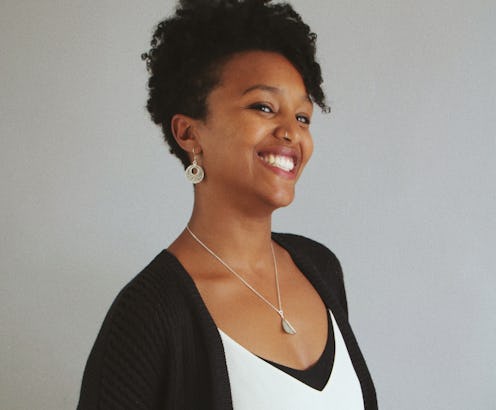Style
How Holy Curls Founder Badria Ahmed Keeps Her Hair Moisturised For Days

"Your curls are as unique as you are," Badria Ahmed, the founder of haircare company Holy Curls, tells me. Whether you've got coils, curls, waves, or kinks, for black women, hair a huge part of our identity. Growing up in Western society, we straighten, relax, perm, or try any method we can to tame our natural curls and fit in with Eurocentric ideals of beauty. And I for one know just how taxing it can be. It can be hard to embrace your natural hair when it feels like you aren't represented in the media and all you see are women with beautiful, flowing straight hair.
I rebelled against my curls for almost 13 years, everyday straightening them until one day I decided to embrace my natural curls. I've never looked back since.
But, as we all know, starting your natural hair journey isn't easy. It's imperative you find products that nourish and protect your curls, keeping them perfectly coiled all day long, while also fighting frizz.
Enter Holy Curls, a black-owned hair care range based in London and "inclusive by nature." They describe themselves as "open to everything, but true to ourselves." Holy Curls are a brand that cater to wavy, spiral, tight, or kinky curls, so rest assured they will definitely have something for your hair type.
I sat down with the brand's founder, Badria Ahmed, to find out why it was so important to her to create a brand specifically for black hair, and what are recent travels around Madagascar, Kenya, and Tanzania taught her about haircare.
Lollie King: What was the inspiration behind the brand?
Badria Ahmed: The inspiration has been my experiences with my own hair. Growing up in Sweden, we really didn’t have many options when it came to products that cater to thick afro hair and my poor mum chemically permed my hair when I was 7 years old as she had no clue how to care for it. By the time I was 22, I had enough of the perm and decided to go back to my natural state. I chopped off my chemically damaged hair and went on a journey of self exploration and learning about the structure and composition of my curl type to understand how to care for it properly. I was also making my own mixtures for my hair as I still couldn’t find products that could properly moisturise my tight curls. And from there, Holy Curls was born.
LK: How important was it to you to cater specifically to the POC/curly hair type?
BA: Very important. For such a long time we were massively underrepresented in the hair care market. Today we have many great brands that cater specifically to curly/kinky hair, but why shouldn’t we have the luxury to be picky?
LK: Is there a specific curl routine you swear by?
BA: My curls are super tight and I experience dryness very quickly, so my hair routine needs to cater to this. What really works for me is applying the styling products (curls cream and curl gel) straight after conditioning while my hair is dripping wet. I then put my hair in a few twists that I keep overnight. In the morning when I undo the twists my hair is always amazing and my curls stay moisturised for days.
LK: Why is it important that you use natural ingredients in your products?
BA: It was very important for me from the beginning to develop the products with only natural and naturally derived ingredients. I didn’t want to put anything out there that wasn’t good for people and our planet. All the ingredients we use are biodegradable, free of nasty chemicals, and never tested on animals.
LK: How did your travels around Madagascar, Kenya, and Tanzania meeting local communities shape this brand?
BA: I went on my travels at a time when I was searching for the right ingredients for the range and it was then that I discovered the baobab oil and the meaning that the baobab tree has for many African communities and how it's such a big part of their beauty routine. This became the hero ingredient in the range. During my travels, I talked to so many women about their hair routines and this really inspired me to use ingredients that are based on the beauty rituals that women have across different areas of the world. These include coconut (India), baobab oil and shea butter (Africa), Cupuacu butter (Amazonia), and aloe vera, which has been used for thousands of years for both health and beauty. The compass in our logo stands for all of this.
LK: What's the best curl advice you could give anyone?
BA: Your curls are as unique as you are. Know what works for you and your hair. Do your research and take the time to understand what the ingredients on the back of your products actually are.
This article was originally published on